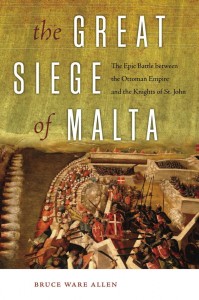 “Nothing is better known than this siege.” Voltaire
“Nothing is better known than this siege.” Voltaire
Such was the case 250 years ago, 200 years after the events in question. These days, it’s harder to make Voltaire’s case.
The Knights of St John of Jerusalem, a Christian order of crusading monks had been expelled from the Holy Land in 1209, expelled from the island of Rhodes in 1522, from Tripoli in 1550. Malta, halfway between Sicily and North Africa, Spain and Constantinople, was their final holdout, and in 1565 the combined forces of the powerful Ottoman Empire and the ferocious Barbary Corsairs descended on the island to exterminate them once and for all. At issue was not just the future of the Order, but the fate of Mediterranean Europe; for if the Ottomans could take Malta, their intention was to use the island and its remarkable deep water harbor as a springboard for retaking Sicily, southern Italy, and even Spain itself.
The struggle involved such extraordinary men as the steely Gascon, Jean de Valette, Grand Master of the Knights of St John; octogenarian legend Torgut Rais, leader of the Barbary Corsairs; the brilliant but ailing military strategist Don Garcia de Toledo, Viceroy of Sicily and commander in chief of relief forces; Mustapha Pasha, the luckless Ottoman army who more than once came within an ace of victory. The siege took nearly five months of brutal fighting in the scorching heat of a Maltese summer, all of it followed anxiously by the whole of Europe.
Often overshadowed by the naval battle of Lepanto five years later, the Siege of Malta was the more significant of the encounters. Had Malta not held out, Lepanto would likely never have been fought. Would that have mattered so very much?
We are accustomed to think of the Mediterranean as a divide between a Christian Europe and a Muslim North Africa. It was not always so. Egypt, indeed all of North Africa, was once a stronghold of Christianity; Spain, Sicily (and Malta itself) once figured as part of Dar as Salaam. The line drawn in water had more or less stabilized by 1565 to what we recognize today. That we do so is largely dependent on what happened that long hot summer on the island of Malta. Had the outcome been other than it was, the political and religious divide of the Mediterranean might be significantly different.
The Great Siege of Malta: The Epic Battle between the Ottoman Empire and the Knights of St. John shows in fast moving prose just how near run a thing it was.